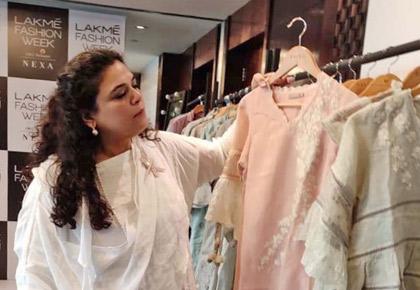'The heart is to honour all who have been struck by Covid and the map signifies that as a country, we can win this together.'
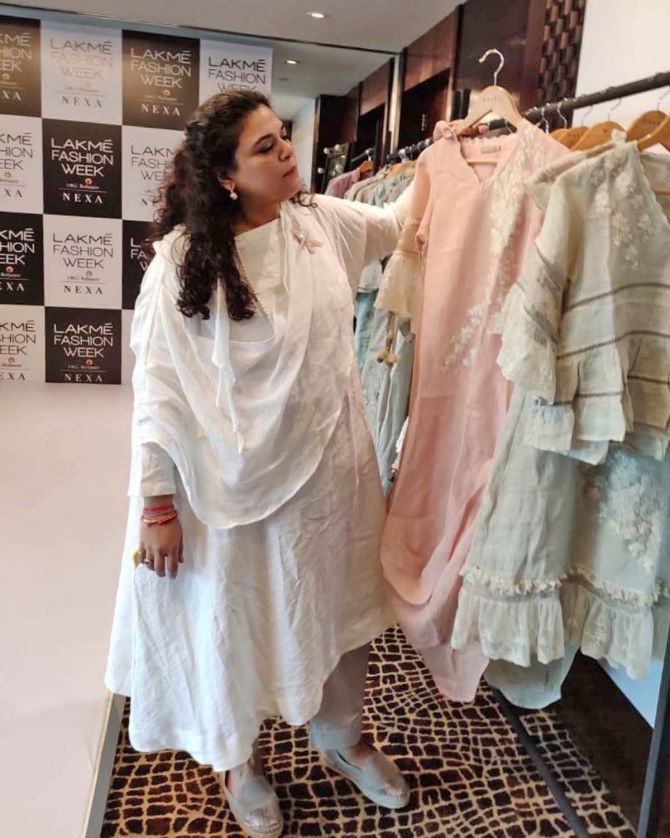
The fashion industry was one of the worst hit during the nationwide lockdown.
In the last one year, designers like Kaveri Lalchand have adapted to the new normal and found smart ways to keep businesses running so people don't lose their jobs and income.
In 2021, the Chennai-based designer started the Mask India Project and distributed over 5,000 masks free of cost to the underprivileged and those working in the essential sector.
"It was my way of providing WFH opportunity to the team and also using our own bits of fabrics," says Kaveri who provided sewing machines to tailors last year so they could continue working from home.
In an e-mail interaction with Divya Nair/Rediff.com, Kaveri Lalchand reveals how she helped her brand overlook challenges and continued working through the lockdown.
What inspired you to start The Mask India Project?
Last year all this came down all of a sudden. We were all immediately locked down.
We didn't know what had hit us. When the lockdown was lifted after 1.5 months, we went back to work. We opened up bit by bit.
We limped, hopped and finally, skipped back to life.
And we were told we need to wear masks all the time. It was the simplest and most effective way to protect ourselves.
So we started making masks. And one year down the line, we need to be protected now more than ever.
At Kaveri, we are focused on the welfare of the country and the health and safety of our employees, friends and family and the community at large.
Our masks have been hugely popular and this is was one way we could think of to give back to the community.
So we started The Mask India Project where we manufacture and distribute masks free of cost.
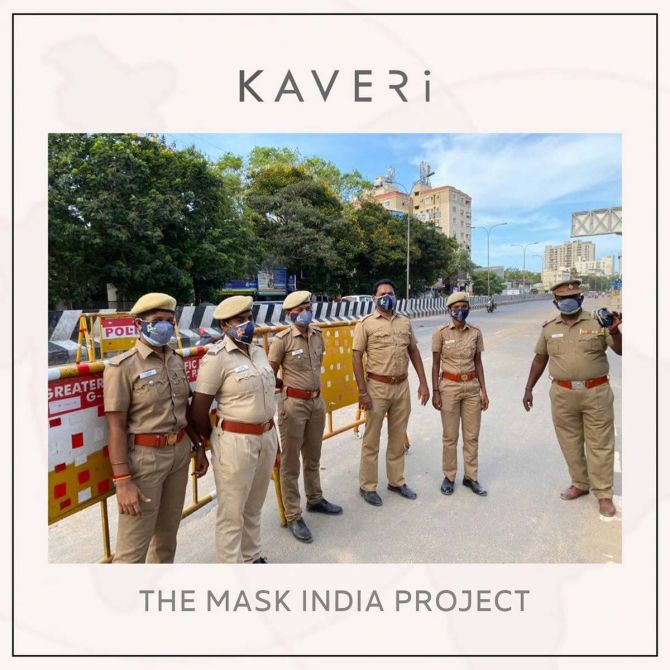
How did you design these masks?
The masks that we distribute are three-layer, reusable cloth masks. The top layer is linen and the inner two layers are cotton.
The mask is printed with our logo and the map of India with a heart at its centre.
The heart is to honour all who have been struck by Covid and the map signifies that as a country, we can win this together.
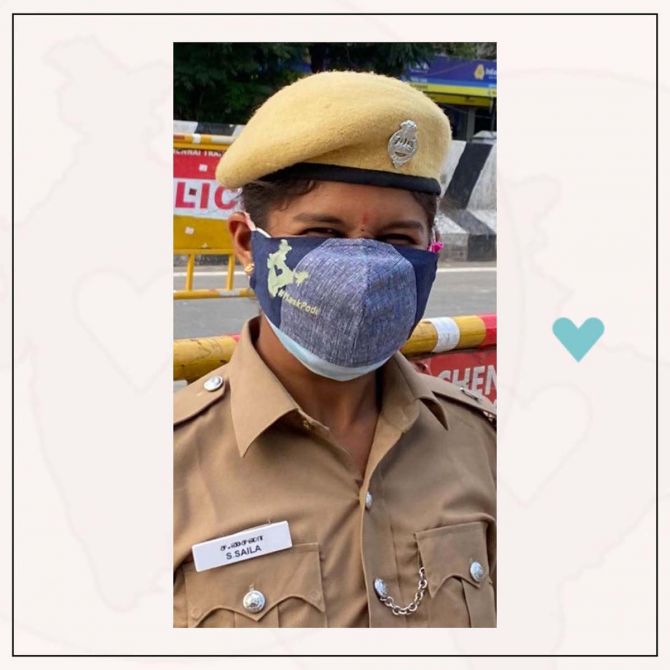
How did you ensure your masks reach the right people and serves its purpose?
We joined hands with the Bay Area Mask Care Project (USA) and with Chennai Volunteers and the #MaskPodu movements to give away thousands of masks to people of Chennai.
Masks are also being distributed through the Suyam Charitable Trust (a non-governmental organisation) to children in rural Tamil Nadu.
We have distributed nearly 5,000 masks till now and distributing more every day. Initially, we were bearing the costs for the masks.
It was my way of providing WFH opportunity to the team and also using our own bits of fabrics. But now we have well-wishers and other corporates who are donating towards this project.
Do you plan to extend this model to other cities beyond Chennai?
Yes, we have got requests on Instagram and Facebook for masks. Now we are sending 1,000 masks for a whole village in Haryana.
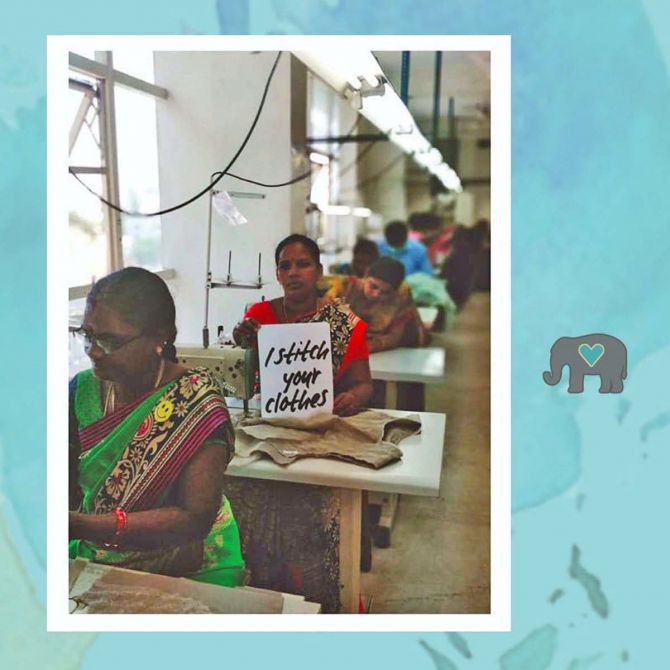
How did you ensure your team did not lose jobs and income in the lockdown?
Last year when we were locked down for the first time, we worked very fast to arrange cuttings and other materials so that the tailors could work from home.
I gave sewing machines to many tailors as we had to close down one factory so that they had a machine at home on which they could work on.
Now this time round, through The Mask India Project initiative, the employees who are working from home are kept motivated and busy, as they are paid for every mask they stitch.
Special sick leave has also been introduced for employees and the brand also helps cover medical expenses.
We have created ways for our team to work from home.
We have given our tailors sewing machines. We organised vaccination drives for the whole team and their families.
As an entrepreneur and designer, how do you deal with challenges?
We faced many challenges, but I am not one to back down.
Finding solutions, changing course, letting go of the old and being quick to start off with the new are some things I am open to and ready for at all times.
It was a blow firstly to absorb the huge loss of investments put into our lovely stores and new factory, as we took the decision to close down our Mumbai retail outlets as they were very cost-high.
And as there were no retail stores or exhibitions, our next challenge was how to make sales.
We quickly switched to selling online, focused more on our social media marketing and direct marketing.
It was a blessing that we have a large loyal and very satisfied customer database and were very forming to support us.
Once lockdown was lifted and we got back to work, we were very strict with following safety protocols as required.
Many of our team members had gone back to their homes and had not returned, so we had to operate with a very limited team and we had a huge backlog of orders. But that said, we slowly and surely worked it all out and got back on track.
One thing which I feel very strongly and personally for is paying wages to the team.
That was a big challenge but everyone understood the situation and we were able to make sure everyone was paid.
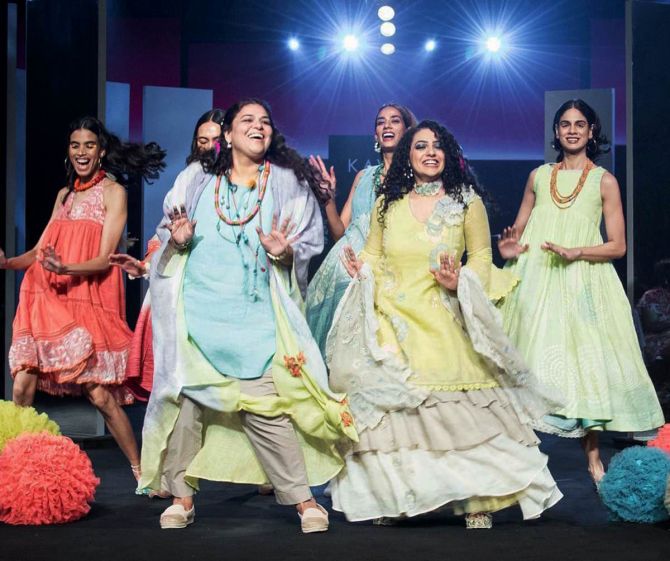
What have been some of your greatest learnings as an entrepreneur?
You have to live, breathe, feel your business every moment.
What YOU can do, no one else can bring to the table.
You have to lead by example and it's very special if you can motivate the team to be as dedicated, enthusiastic and to believe in the product as much as you do.
Oh, and to take every opportunity and make it a learning. And learn every day.
Every day will throw up its own set of challenges, so we need to learn from it.
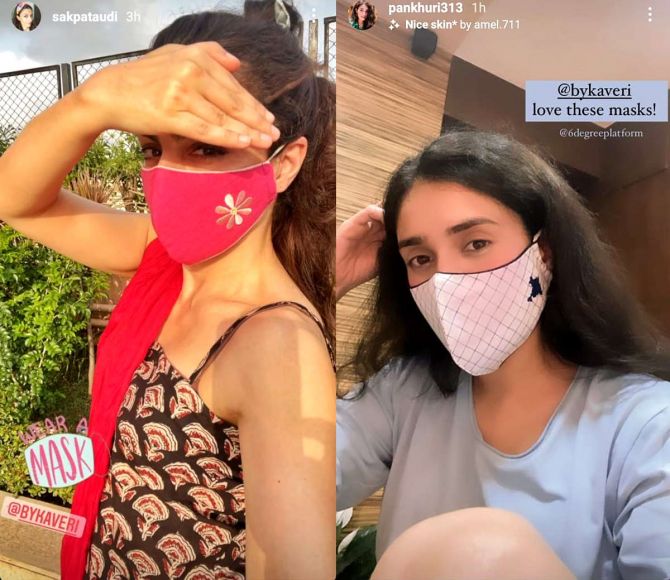
In your opinion, how has the pandemic changed the way people consume fashion?
People are buying more casual garments as there are not so many occasions to dress up for.
They are also a bit more cost conscious, but I think the most important thing that consumers are considering more now is comfort.
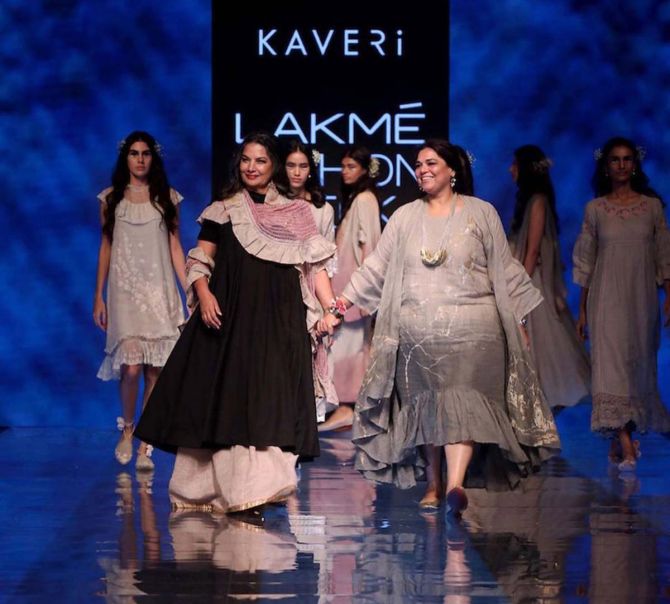
A celebrity you recently enjoyed working with
Shabana Azmi. She is amazing. She is so wise and experienced. She knows what she wants and knows what will work.
She is kind and generous and a thorough professional. And of course, (I admire) her talent and strength.
If someone wants to make responsible choices in fashion, how would you guide them?
There are a few principles I live by and also share the same with my customers and clients:
- Choose well. Make it last.
- Buy what you love.
- Wear clothes that matter.
- Be natural. Make that your lifestyle choice.
Plus-size women often find it difficult to find the right size and fit of clothes. How can they style themselves to look fashionable yet comfortable?
We (Kaveri, the label) offer a wide size range - from XS to XXXXL -- regular sizes for regular people! We don't have a special 'plus size' range, just standard sizes that suit you.
Yes, bigger women do find it difficult to find clothing because the industry sets very unrealistic standards and designers unthinkingly follow them.
I design for bigger women first, so my styles and cuts are inclusive to all.
What are you currently working on?
Currently ,I am working on sending out all my pending orders as soon as I can!
We are also working on the launch of our home textiles line, our Pret-K line which are more affordable and comfort fit garments and also our festive line to be launched later this year.
How can aspiring designers make a successful career in fashion?
Get as much experience as you can.
Always be open. Learn and see.
Everything is available at the touch of our fingertips, so there is no reason not to research and learn.
I remember back in the late '80s, I would ask my father to bring back Vogue magazines from his business trips overseas and would pore over them, taking in every bit of that magazine.
Now everything is there for the taking.
So I would say, do more, learn more, create, experiment.
And think: As a designer, what it is you really want to put out into this world -- and why?
